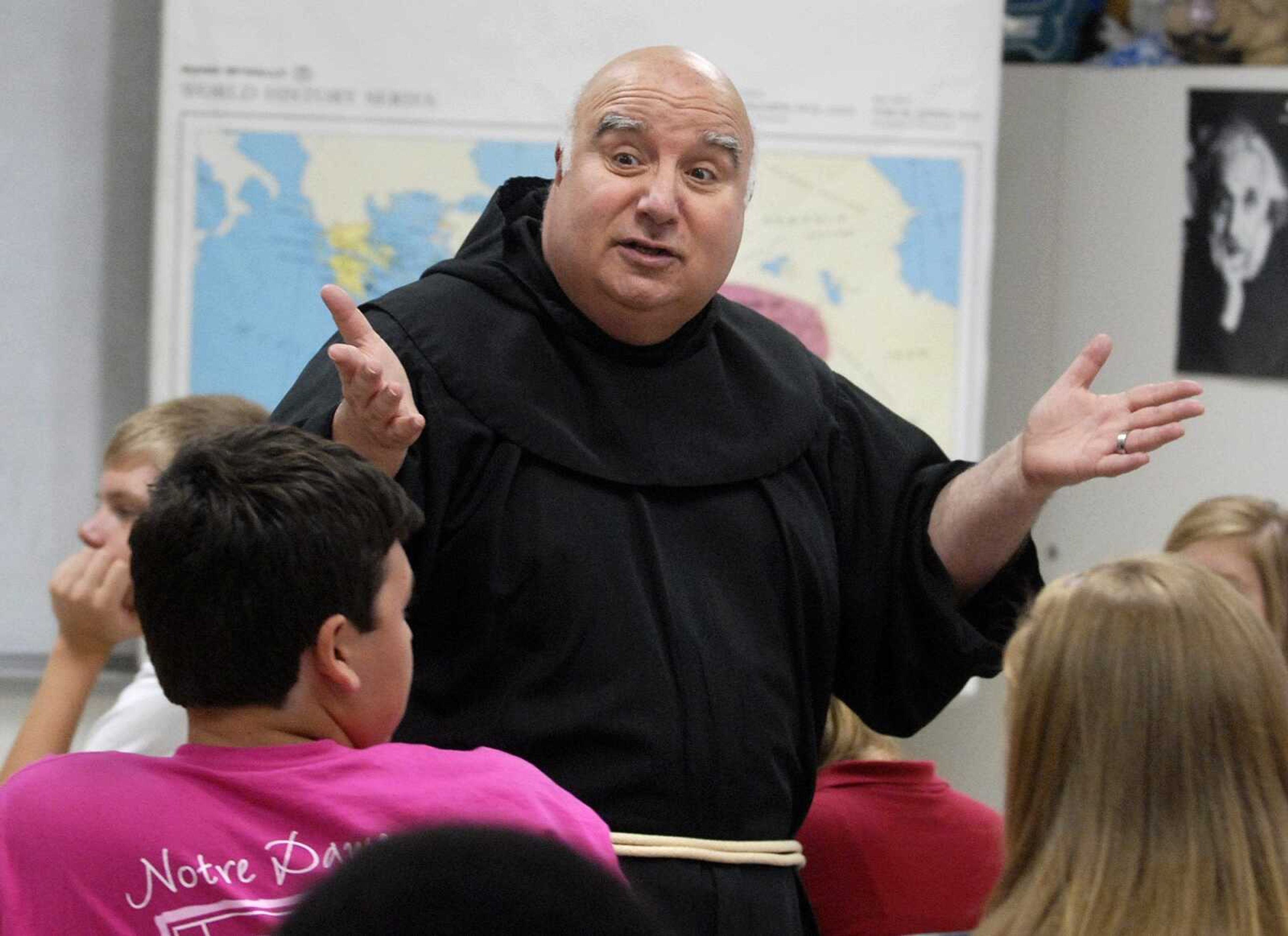Lessons of 2001 need to be taught, educators say
In the fall following Sept. 11, 2001, the husband of a woman who died in the attacks on the World Trade Center spoke to more than 500 students during an assembly at Notre Dame Regional High School. "The last thing she said to him was, 'Honey, don't worry, I'm going to go back to work. I love you.' Everyone was going back in. As she said that, the second plane hit, and the phone went dead," said the high school's principal, Brother David Anthony Migliorino...
In the fall following Sept. 11, 2001, the husband of a woman who died in the attacks on the World Trade Center spoke to more than 500 students during an assembly at Notre Dame Regional High School.
"The last thing she said to him was, 'Honey, don't worry, I'm going to go back to work. I love you.' Everyone was going back in. As she said that, the second plane hit, and the phone went dead," said the high school's principal, Brother David Anthony Migliorino.
When the husband was finished telling his story, all was quiet in the gym.
"You could have heard a pin drop," Migliorino said.
Every year, Migliorino, who is also a history teacher, spends about a week teaching his students about the events of 9/11. He said that the events of that day could be sugarcoated but that teachers don't need to do that.
"These are lessons that we need to teach, and we need to realize as a nation that we are vulnerable. Our parents and teachers need to reiterate this to students," he said.
A native New Yorker, Migliorino grew up a mile from the World Trade Center. His high school held proms in the upper floors of the trade center towers. On his visits home every summer, he sees a different downtown Manhattan that he doesn't as easily recognize. Relationships and community connections there were shattered in one day of attacks, he said, and will never be the same again. He talks to his students about the effects on the families, friends and neighbors of 9/11 victims. He also talks to them about the upbringing and training of the men of al-Qaida who attacked the United States, and gives them background on why the United States dislikes certain nations.
Migliorino said when he was a student, he was taught that the only real attacks that ever happened on American soil were during the bombing of Pearl Harbor and the Civil War. Prior to 9/11, he said, he also taught his students that there would never be a mainland attack.
"Now that whole concept is gone," he said.
Migliorino and other area educators who do spend time teaching 9/11 as a historical event may be an exception.
According to a forthcoming study, fewer than half of states explicitly identify the 9/11 attacks in high school standards for social studies. Often the decision to teach about 9/11 is left up to individual teachers, but there is a wealth of materials available. Most recently, the New Jersey education department released a voluntary K-12 curriculum including information on the historical context of terrorism, the war in Afghanistan and debates over security vs. civil liberties, named "Learning from the Challenges of Our Times: Global Security, Terrorism and 9/11 in the Classroom."
Migliorino said the lessons of 9/11 should be taught like the lessons of the Holocaust.
"We should always teach that man did that to man," he said. "So it will never happen again."
Kyle Mabuce, a social studies teacher at Jackson's Russell Hawkins Junior High School, was overseeing a study hall session in the cafeteria of the school when the attacks occurred. He had walked to the library briefly and overheard news of planes crashing into the World Trade Center from an interruption to regular programming on the talk station the librarian often listened to throughout the day. Mabuce quickly brought his students into the library to listen, but the bell rang, so they went to a classroom where he tuned into a TV news channel.
Through the morning he led his class in creating a board that helped them try to understand what was happening by keeping a running list of what they were seeing that they thought were likely rumors versus facts about the attacks. By noon, Bin Laden's name was up on the board. He said he remembers the day as a surreal experience.
"I was trying to process it personally at the same time I was teaching, and trying to explain to the kids what was happening in a rational way," he said.
Several students asked Mabuce if the attacks meant the United States would be going to war. Their questions connect to how Mabuce teaches his students today about 9/11.
"Day-to-day life hasn't changed much, but pretty much their entire lives they have heard about the wars in Afghanistan and Iraq," he said. " I try to get them to stop and think about that."
His lessons on 9/11 focus on service members and veterans who have fought in the wars since.
"Students have a much more immediate connection to that. Some have parents, friends or neighbors who are veterans or are in the military," Mabuce said. "Most of the conversation comes from that. You have to make it real for them."
The Associated Press contributed to this report.
eragan@semissourian.com
388-3627
Pertinent address:
265 Notre Dame Drive, Cape Girardeau, MO
210 North West Lane, Jackson, MO
Connect with the Southeast Missourian Newsroom:
For corrections to this story or other insights for the editor, click here. To submit a letter to the editor, click here. To learn about the Southeast Missourian’s AI Policy, click here.








